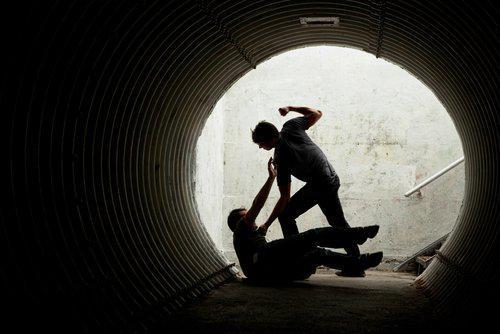Recent Blog Posts
Disorderly Conduct in Wisconsin
 Whenever you think of disorderly conduct (also referred to as “disturbing the peace”), you may think of an individual or group of individuals engaging in some kind of activity that is offensive or disruptive to the public. The laws prohibiting disorderly conduct allow law enforcement officers to arrest individuals who interfere with other people’s use and enjoyment of public areas. Disorderly conduct covers a broad range of activities.
Whenever you think of disorderly conduct (also referred to as “disturbing the peace”), you may think of an individual or group of individuals engaging in some kind of activity that is offensive or disruptive to the public. The laws prohibiting disorderly conduct allow law enforcement officers to arrest individuals who interfere with other people’s use and enjoyment of public areas. Disorderly conduct covers a broad range of activities.
In Wisconsin, an individual is guilty of disorderly conduct when he or she, “in a public or private place, engages in violent, abusive, indecent, profane, boisterous, unreasonably loud or otherwise disorderly conduct under circumstances in which the conduct tends to cause or provoke a disturbance.” This crime is charged as a Class B misdemeanor, which carries a maximum fine for $1,000 and/or up to 90 days in jail.
The Charge of Substantial Battery
 There are many different types of battery in Wisconsin. As such, you can be charged with battery and be facing either misdemeanor charges or felony charges. One type of felony battery in Wisconsin is known as substantial battery. If you are facing substantial battery felony charges, it is imperative you reach out to an attorney for immediate assistance.
There are many different types of battery in Wisconsin. As such, you can be charged with battery and be facing either misdemeanor charges or felony charges. One type of felony battery in Wisconsin is known as substantial battery. If you are facing substantial battery felony charges, it is imperative you reach out to an attorney for immediate assistance.
Substantial Battery as Defined
The most important thing for you to understand about substantial battery is that the prosecutor does not need to prove that you intended to cause substantial bodily harm. All the prosecutor needs to show is that you intended to cause any bodily harm, and that suffices. It used to be that the prosecutor was required to prove that you intended to cause the “substantial” harm that resulted, rather than just any level of harm. That was a much easier standard to defend, especially since many times people lash out in the heat of the moment and the damage caused is far greater than what was intended.
Armed Robbery Charges in Wisconsin
 Armed robbery is a violent crime legislated by statute in Wisconsin as a Class C felony. Depending on the specific charge, it is punishable by up to 40 years prison and up to a $100,000 fine.
Armed robbery is a violent crime legislated by statute in Wisconsin as a Class C felony. Depending on the specific charge, it is punishable by up to 40 years prison and up to a $100,000 fine.
To be convicted of robbery in Wisconsin, the court generally requires proof beyond a reasonable doubt that somebody else possessed the property in question; that the person charged with armed robbery took the property from the person in question with the intent to steal it; and that the defendant used or threatened to use force to take the property.
What Else Must the State Prove to Convict You of Armed Robbery?
Armed robbery, because of the great risk to the general public for violence, is punished severely in Wisconsin and elsewhere if you are found guilty. To prove armed robbery, in addition to the requirements above, the state of Wisconsin also needs to prove that at the time the property was stolen, you used or threatened to use a weapon or a dangerous article in a manner that led the victim to reasonably believe that it was in fact a dangerous weapon.
Heroin and Homicide Charges in Wisconsin
 Heroin addiction is growing in Wisconsin and throughout the nation, and lawmakers are attempting to discourage this through the adoption of harsh legal penalties. Just this past June, a 36-year-old woman was sentenced to five years in prison for reckless homicide after providing heroin to a man that overdosed. She was not accused of being a drug dealer, but was still charged and imprisoned for homicide for providing heroin which resulted in death.
Heroin addiction is growing in Wisconsin and throughout the nation, and lawmakers are attempting to discourage this through the adoption of harsh legal penalties. Just this past June, a 36-year-old woman was sentenced to five years in prison for reckless homicide after providing heroin to a man that overdosed. She was not accused of being a drug dealer, but was still charged and imprisoned for homicide for providing heroin which resulted in death.
What Is Reckless Homicide in Wisconsin?
You can be convicted of first degree reckless homicide in Wisconsin, which is a Class B felony, if a prosecutor proves that you caused the death of another person under circumstances that show utter disregard for human life. In the circumstances described above, however, the Wisconsin legislature has determined that the appropriate charge is a Class C felony.
Will Milwaukee Patrol Officers Have Body Cameras by the End of 2016?
 The past several years have seen a rise in tension between police officers and the communities in which they work, especially African American communities. Since the death of Michael Brown and the unrest in Ferguson, calls have grown louder in Wisconsin and around the country for reform. One particular reform that is being implemented in major cities throughout the country is the use of body cameras on police officers. Similar calls have been made here in Wisconsin, with differing success to date. A Tale of Two Cities There is good news on the horizon for Milwaukee residents who have been the victim of police brutality in the past. By the end of 2016, the entire Milwaukee police department may be outfitted with body cameras, much sooner than police officers in many other big cities throughout the United States. This is what the mayor of Milwaukee has proposed, and it will cost $880,000 to implement in the 2016 budget. This comes on the heels of many tense moments between police and citizens in the past year, as well as a White House task force that reported that body cameras reduce officers’ use of force and complaints about excessive force. At the same time Milwaukee is poised to lead the nation on this issue, an advisory board in Madison voted four against two in September against a pilot program requiring patrol officers to be outfitted with body cameras. A petition has been started, however, by concerned citizens to also require Madison officers to be equipped with body cameras, based on a high number of excessive force complaints. What to Do in the Meantime The budget for body cameras in Milwaukee has still not been approved, and there are no plans on the horizon for Madison officers to be outfitted with body cameras. The rest of Wisconsin lags behind the major metropolitan areas. In the interim, we continue to hear stories of citizens who feel their rights were violated by the police when they were arrested. Of course, many police officers are overwhelmingly decent and law-abiding citizens, who protect the rest of us at great personal risk to their own safety. However, there are cases in Wisconsin and throughout the nation where people’s rights are violated by overzealous police officer or in other situations where tempers flare. Do You Think Your Rights Have Been Violated by the Police?
The past several years have seen a rise in tension between police officers and the communities in which they work, especially African American communities. Since the death of Michael Brown and the unrest in Ferguson, calls have grown louder in Wisconsin and around the country for reform. One particular reform that is being implemented in major cities throughout the country is the use of body cameras on police officers. Similar calls have been made here in Wisconsin, with differing success to date. A Tale of Two Cities There is good news on the horizon for Milwaukee residents who have been the victim of police brutality in the past. By the end of 2016, the entire Milwaukee police department may be outfitted with body cameras, much sooner than police officers in many other big cities throughout the United States. This is what the mayor of Milwaukee has proposed, and it will cost $880,000 to implement in the 2016 budget. This comes on the heels of many tense moments between police and citizens in the past year, as well as a White House task force that reported that body cameras reduce officers’ use of force and complaints about excessive force. At the same time Milwaukee is poised to lead the nation on this issue, an advisory board in Madison voted four against two in September against a pilot program requiring patrol officers to be outfitted with body cameras. A petition has been started, however, by concerned citizens to also require Madison officers to be equipped with body cameras, based on a high number of excessive force complaints. What to Do in the Meantime The budget for body cameras in Milwaukee has still not been approved, and there are no plans on the horizon for Madison officers to be outfitted with body cameras. The rest of Wisconsin lags behind the major metropolitan areas. In the interim, we continue to hear stories of citizens who feel their rights were violated by the police when they were arrested. Of course, many police officers are overwhelmingly decent and law-abiding citizens, who protect the rest of us at great personal risk to their own safety. However, there are cases in Wisconsin and throughout the nation where people’s rights are violated by overzealous police officer or in other situations where tempers flare. Do You Think Your Rights Have Been Violated by the Police?
Internet Sex Crimes
 You are most likely familiar with the crimes associated with child pornography and prostitution, just from watching television. What you may not know is that these crimes are sometimes part of a subset of crimes referred to as Internet sex crimes. If you are accused of, or arrested for, an internet sex crime, you are already facing life-altering and permanent damage to your reputation. Your family relationships and employment status can also be negatively affected just from the allegation alone.
You are most likely familiar with the crimes associated with child pornography and prostitution, just from watching television. What you may not know is that these crimes are sometimes part of a subset of crimes referred to as Internet sex crimes. If you are accused of, or arrested for, an internet sex crime, you are already facing life-altering and permanent damage to your reputation. Your family relationships and employment status can also be negatively affected just from the allegation alone.
Because of the nature of these crimes and the serious repercussions just the accusation brings, it is important to be proactive if you think you might be accused of or arrested for an internet sex crime. Being proactive begins with consulting an experienced, aggressive criminal defense attorney.
What Are the Various Internet Sex Crimes?
The Legal Differences between Assault and Battery
 Although you often hear the term assault and battery as one phrase, they are actually very different. Assault is one thing and battery is another. If someone has been battered, they have likely been assaulted as well, although the reverse is not necessarily true. What is true is that there are a variety of different circumstances that can give rise to charges of assault and/or battery, and the potential penalties depend on the facts of each case.
Although you often hear the term assault and battery as one phrase, they are actually very different. Assault is one thing and battery is another. If someone has been battered, they have likely been assaulted as well, although the reverse is not necessarily true. What is true is that there are a variety of different circumstances that can give rise to charges of assault and/or battery, and the potential penalties depend on the facts of each case.
Assault and Battery Defined
In general, assault is defined as something which causes another person to fear imminent bodily harm. No physical contact is necessary for a person to be assaulted. Assault charges are often pursued in civil court, along with battery charges or independently.
In Wisconsin, Battery charges carry varying levels of criminal fines and penalties, and there are many types of battery in Wisconsin. The term battery is generally defined as the use of force against someone with the intent to injure them. There are special provisions governing your case if you are charged with aggravated battery, battery against an unborn child, or battery against a witness, judge, or other public figure. Because the terms assault and battery are used so loosely and interchangeably in the general public, and can mean so many different things even under the law, it is crucial that you have an experienced Milwaukee criminal defense attorney by your side to aggressively defend you.
Defending against Sexual Assault
 Charges of sexual assault are very serious and should not be taken lightly. Aside from their seriousness, they are also embarrassing and carry stigma that will follow you the rest of your life, even if you are innocent of the accusations.
Charges of sexual assault are very serious and should not be taken lightly. Aside from their seriousness, they are also embarrassing and carry stigma that will follow you the rest of your life, even if you are innocent of the accusations.
Wisconsin law has different categories of sexual assault, but it is generally defined as non-consensual sexual intercourse, through the threat of force, violence, pregnancy or that causes great bodily harm. The most commonly known form of sexual assault is rape. Sexual assault charges carry hefty penalties depending on the degree:
- First degree sexual assault is a Class B felony, which carries up to 60 years in prison;
- Second degree sexual assault is a Class C felony, which carries up to 40 years in prison and/or up to $100,000 in fines;
- Third degree sexual assault is a Class G felony, which carries a prison sentence of up to 10 years and up to $25,000 in fines, or both; and
The Crime of Battery in Wisconsin
 Whether your team wins or loses, highly anticipated sporting events often make people do things and say things that are out of their general character. In addition to spikes of OWI arrests after large sporting events, there is often a measurable increase in crimes of battery. An example of this occurred recently after the Wisconsin-Indiana football game.
Whether your team wins or loses, highly anticipated sporting events often make people do things and say things that are out of their general character. In addition to spikes of OWI arrests after large sporting events, there is often a measurable increase in crimes of battery. An example of this occurred recently after the Wisconsin-Indiana football game.
The Incident
The incident occurred after the October 3rd game between the Hawkeyes and the Badgers, at which the Hawkeyes defeated the Badgers by a score of 10-6. As a 15-year-old boy wearing Iowa Hawkeyes apparel was leaving the stadium with his friends, a Wisconsin fan allegedly punched him in the face. According to the boy, he was “mildly” teasing his friend (a Badgers fan) about the Iowa win when the man approached him, punched him in the face, and then fled into the crowd. The police have not caught the man.The UW-Madison Police Department has classified this as a battery, and has asked the community for help finding the attacker. Although the boy suffered only minor scrapes and bruises, the police department issued a statement priding Badgers fans as being respectful to all fans, and noting that it is great sportsmanship that makes Badger game days one of the most well-known traditions in the nation.
Hit and Run Laws in Wisconsin
 Did you know that if you are involved in a car accident, even if you are rear-ended, sideswiped, or otherwise not at fault, it is your legal duty to stop immediately? Once you stop, there are other legal requirements you must follow. Failure to comply with the duties imposed by Wisconsin law after an accident can result in serious trouble. You will be charged with hit and run, which can be either a misdemeanor or a felony, depending on the severity of the accident. At worst, it is punishable with jail time and steep fines.
Did you know that if you are involved in a car accident, even if you are rear-ended, sideswiped, or otherwise not at fault, it is your legal duty to stop immediately? Once you stop, there are other legal requirements you must follow. Failure to comply with the duties imposed by Wisconsin law after an accident can result in serious trouble. You will be charged with hit and run, which can be either a misdemeanor or a felony, depending on the severity of the accident. At worst, it is punishable with jail time and steep fines.
What Are Your Legal Obligations after an Accident?
Wisconsin law imposes several requirements on drivers after an accident. Whether you believe yourself to be at fault or not, the law requires you to stop your car immediately if you have been involved in an accident with another vehicle, bicycle, or pedestrian. You must do this even if the accident is minor, and there is no bodily injury or even visible property damage.







